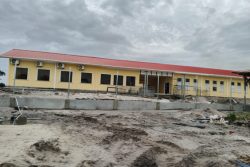“I was asking about if anyone could assist me by asking anyone if they have any used old furniture what they don’t want. I mean like chairs, safe, anything; we don’t have anything to sit on. Myself and the children have to sit on the floor to eat and sleep. We put the wares and cups on the floor; we don’t have a table either or a bed. It’s very rough and tough, I don’t know what to do. I know of people that throw away old furniture and sometimes it does be in good condition; I am very poor. I am so sorry I have to distress and ask about so many things. But what I could say that God Bless always those who have done so much for me and the children – also grandchildren – anything, safe, chair.
 “I don’t even have a stove to cook on. I used bricks and the bricks affect my eyes badly because the fire smoke all the time. I cook with coconut shell, anyway I am praying that my prayers will go up and the blessing will come down.
“I don’t even have a stove to cook on. I used bricks and the bricks affect my eyes badly because the fire smoke all the time. I cook with coconut shell, anyway I am praying that my prayers will go up and the blessing will come down.
“Please I don’t need new things.”
That is a letter from a consumer who lives in the bottom flat of a condemned building with five grandchildren and great grandchildren. Her income is six thousand dollars per month from the old age pension.
When it rains the room she occupies is flooded and she has to wait for the water to recede before she makes up her beds with planks of wood.
When the rainy season steps in what will she do?
The Poverty Reduction Programme which ended in 2005
This criticism come from the Guyana Consumers Association:
“For many years now, the Government of Guyana has had poverty reduction as one of its major polices. There are, of course, sound social economic and humanitarian reasons for such a policy, but like all policies with a seemingly balanced social and economic content, it is difficult to decide what aspect to emphasize in confronting poverty reduction. Administrators are faced with three basic courses. The first is trying to improve the quality of life of the underprivileged as for, example, by the provision of potable water; the second is to help the poor to increase their incomes as, for example, the Women of Worth initiative; and the third is to render direct assistance in terms of money and goods.
“The first two alternatives tend to be long or medium-term. The third alternative is according immediate relief of poverty and alleviating suffering. As consumer advocate and humanitarians we generally opt for immediate relief for as Lord Keynes, the great economist once remarked, by the time the better policies come to fruition, we are all dead. We would, therefore, without hesitation, support immediate relief in the form of grants of money, goods or services.”








